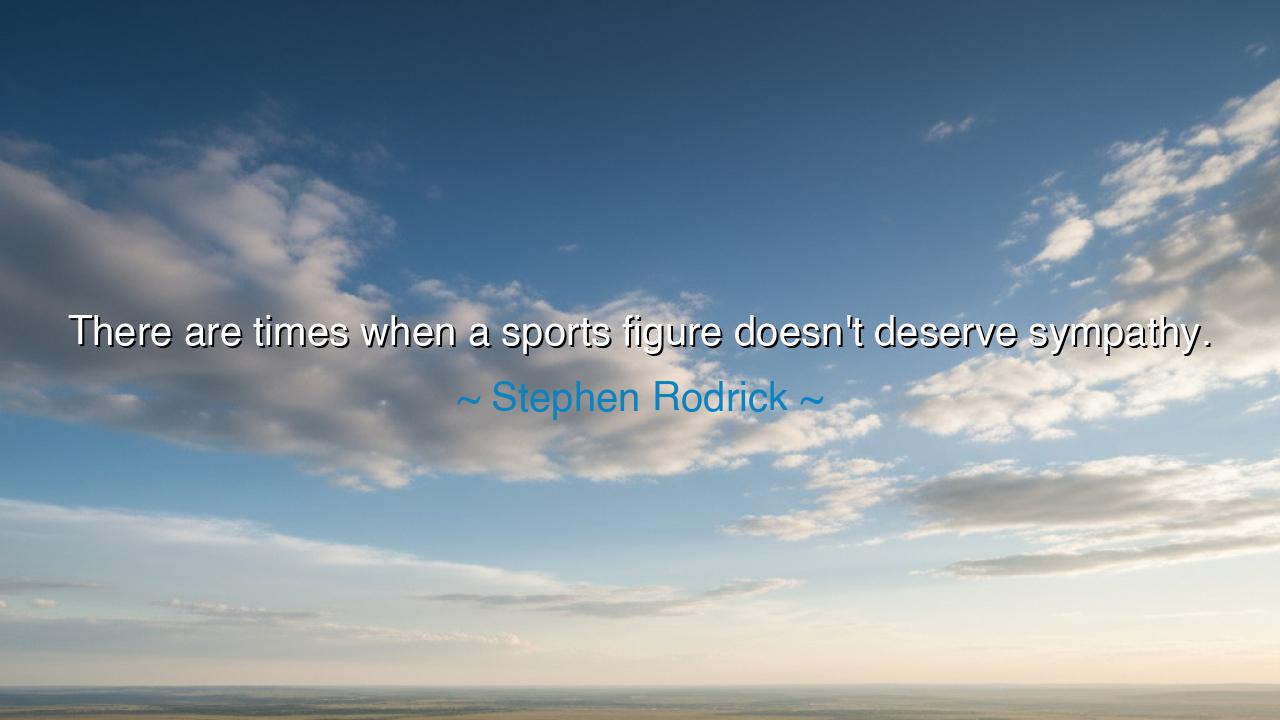
There are times when a sports figure doesn't deserve sympathy.






Come, children of the future, and listen to the wisdom of the ages. In the world of heroes and athletes, where greatness is measured by strength, speed, and skill, there is a truth spoken by the wise Stephen Rodrick: "There are times when a sports figure doesn’t deserve sympathy." These words, simple yet profound, speak of the burdens we place upon those who stand before us as symbols of power, yet are, in truth, only human. Rodrick’s insight calls upon us to recognize that even in the grandest arenas of competition, there exists a point where responsibility outweighs the need for empathy, where the actions of those we idolize must stand alone, judged by their own merits.
The world of sports has long held a sacred place in human history. From the ancient Olympic Games, where athletes competed for the glory of their city-states, to the grand modern arenas where men and women push the limits of human performance, sports have served as a mirror of society's highest ideals: discipline, courage, and resilience. Yet, as the heroes of old faced the weight of their own actions, so too do modern athletes. Rodrick’s words remind us that to idolize a figure for their athletic prowess without recognizing their flaws is to do them a disservice. A hero is not made perfect by their abilities alone, but by the character they show off the field.
Consider the example of Hercules, the legendary hero of Greek myth. Known for his extraordinary strength and valor, Hercules was a figure of awe and admiration. Yet, his path was also one of tragic flaws and mistakes. The twelve labors he performed were not only feats of bravery but also acts of atonement for his own failings. Despite his heroic deeds, there were times when his actions were driven by anger, arrogance, or misunderstanding, and the gods did not shield him from the consequences of his choices. Thus, even the greatest of heroes were held accountable. Rodrick’s point is clear: true greatness is not about escaping the consequences of one’s actions, but about facing them with honor.
In the modern world, we see athletes who, like Hercules, are placed upon pedestals. They are celebrated for their skill, their talent, and their victories, but when they falter, when their actions fall short of the standards we expect, do we offer them sympathy? Take, for example, the story of Lance Armstrong, the cyclist whose achievements were once the pinnacle of human endurance. Yet, his triumphs were marred by the revelation of doping, an act that not only tarnished his legacy but also betrayed the trust of millions who looked up to him. In this case, sympathy for Armstrong’s struggles was not warranted, for the very essence of his success had been built upon deception. Rodrick’s words echo here—sometimes, a sports figure must be held accountable, for they have placed themselves in a position where their actions affect more than just their own lives.
The lesson here, children of the future, is not one of cold-hearted judgment, but of understanding the complex nature of responsibility. To admire athletes for their skill is one thing, but to excuse their failings for the sake of their fame is another. Sympathy must not be a blanket given to all, for the greatness of an individual lies not only in their ability to perform under pressure but in how they handle their mistakes and their obligations to those who support them. We must recognize that athletes are human beings, and like all humans, they are subject to the laws of honor and accountability.
In our own lives, we too must learn to take responsibility for our actions, especially when we step into the public eye or take on roles of leadership. Greatness is not measured by talent alone, but by the integrity with which we live our lives and face our challenges. When you falter, do not seek sympathy to shield you from the consequences. Instead, face those consequences with the courage to learn, grow, and rebuild your reputation. In this, true strength is found—not in the ability to avoid failure, but in the wisdom to confront it head-on.
Thus, children of the future, remember this lesson: Do not offer sympathy to those who, in their greatness, forget their responsibilities. Instead, admire those who, like the heroes of old, show both strength and humility in the face of their own imperfections. Hold yourself accountable, and in doing so, you will become the hero of your own story, one whose legacy is defined not by the victories won, but by the honor and wisdom with which you face both your triumphs and your failures.






AAdministratorAdministrator
Welcome, honored guests. Please leave a comment, we will respond soon